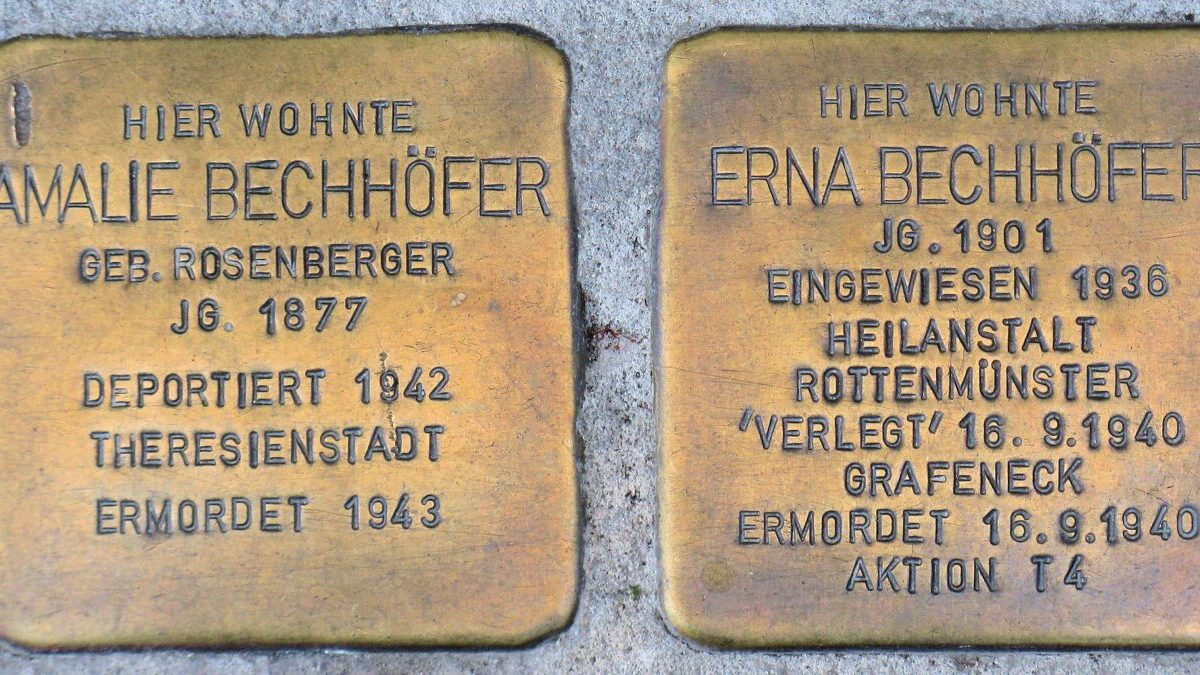
Article by Cheryl Magness in The Federalist
Book About Nazi Slaughter Of The Disabled Nearly Lost To History Sends A Message To Post-Roe America
Edna Hong’s ‘Bright Valley of Love’ shows how a Lutheran community named Bethel cared for those with severe physical and mental challenges.
In 1939, Adolf Hitler signed an order leading to the eventual slaughter of an estimated 300,000 physically disabled and/or mentally ill children and adults in Germany and its annexed territories. The “Euthanasia Program” — or Aktion T4, as it came to be known — consisted of the systematic killing of human beings deemed not worthy of life or care: “useless eaters,” as they were called by some.
The name “Aktion T4” was borrowed from the street address of the office that administered the program: Tiergartenstrasse 4. The scheme was initially built on deception: families were told that their children or other family members were going to receive treatment for their maladies, but instead the “patients” were put to death, usually by lethal injection or gas. The families later received word that their loved ones had died from a natural cause such as pneumonia, their bodies conveniently cremated to avoid questions.
While Aktion T4 was launched in secrecy, the truth of what was happening soon spread, and good people resisted as they could. In Germany, a Lutheran community named Bethel discovered itself, like so many others, in the crosshairs of Hitler’s murderous insanity. Bethel, near the city of Bielefeld, was an institution dedicated to caring for those with severe physical and mental challenges. Administered by the Bodelschwingh Foundation (named after its first director, Rev. Friedrich Christian Carl von Bodelschwingh), it still exists today. The story of Bethel — and particularly of Gunther, a boy who lived the majority of his life in the foundation’s care — is detailed in a little-known book by Edna Hong called “Bright Valley of Love.”
“No good for anything … nothing but a nothing,” Gunther’s grandmother said of the little boy who lived in her house but could not do anything useful because his body was crippled by chronic malnourishment. Gunther’s mother had been “not the best of mothers” and his father, a veteran of World War I, was gone for long periods. While Gunther’s grandmother “swept and scrubbed floors and rubbed clothes on a washboard,” believing that “only people who did something useful like that had any right whatsoever to live in the world,” Gunther lay in a back bedroom being fed turnip soup and “soothing syrup” to keep him sedated.
Sunshine, Milk, and Love
Then, when Gunther was six years old, a miracle happened: his father, who had found a new wife (one who didn’t want a crippled child), took him to live at Bethel. For the next 69 years, until his death in 1989, he was told, in a million different ways, that he wasn’t a nothing but a something — not an accident of nature but a someone created by a loving God who had a plan and purpose for his life. At Bethel he received “sunshine, milk and love,” but especially love — in the care for his body, which slowly gained strength (but never recovered from its childhood deprivation); the friendships he experienced with the other residents; and the constant spiritual nourishment of God’s Word, which underpinned it all.
“Bright Valley of Love” was first published in 1976. Author Edna Hong met Gunther in 1974, having become aware of him through a complicated network of historical and personal connections. She writes in the book’s prologue that it is a “true-to-the-larger-facts story,” as “faithful … as I could make it without writing a dry … history book or a medical textbook. Of course I had to imagine all the ‘he saids’ and ‘she saids,’ for there were no tape recorders then!”
Though a top-notch scholar — Edna and her husband, Howard, were the translators of the critical English edition of Soren Kierkegaard’s writings — Hong’s style, evidenced above, is simple and clear but unfailingly profound, as she fills the pages of her story with sentences that children can easily understand but that will have adults marveling. WWI is the war “the whole world lost, although some countries thought that they had won it.” When Gunther reaches adolescence and begins to worry about what the future holds for him, he wonders whether growing up means “to find out things about yourself and others that you would rather not know.”
Resisting the Nazis
By the time the Nazi regime set its sights on Bethel, Gunther was 26 years old. The Bodelschwingh Foundation, like others, was ordered to turn in a list of its “incurables” but refused. The foundation’s ability to largely avoid the horrendous fate of so many institutions like it was due in no small part to the determination and machinations of Pastor “Fritz” von Bodelschwingh and his staff. It was also due, no doubt, to the hand of God.
The community of Bethel was not, however, untouched by the euthanasia order. In a 1992 radio interview with historian Hans-Walter Schmuhl, who wrote extensively about Bethel, Schmuhl noted that patients who were removed from Bethel early on in an attempt to save them likely ended up in euthanasia centers. This number included seven Jewish patients that did not get picked up by their families when the Bethel staff realized their patients’ lives were in grave danger and put out a call to their families to come get them.
Rediscovery of the Book
Readers can thank Concordia Theological Seminary Press for bringing this singular story back into public view. Rev. Dr. Paul Grime, dean of the chapel at the seminary in Fort Wayne, Ind., shared with The Federalist that he first encountered the book while browsing the seminary library in 2019. It piqued his curiosity, and he began reading it on a road trip while his wife was driving.
After finishing only one chapter he stopped and started again, this time reading it out loud so his wife could listen. After the two returned from their trip, Grime set about securing the reprint rights, eventually connecting with one of Edna Hong’s children (Edna died in 2007).
“I described to [Erik Hong] how I was interested in using the book in class,” Grime explained. “I also mentioned to him that I wished the book could be back in print. Over the course of the next two years, negotiations proceeded until finally … we were able to realize that dream. Given the nature of publishing today, I felt that an electronic version would also be useful. Even more, given all the hymns that are quoted in the book, an audiobook version seemed to be a natural, with the hymns sung.”
Unique Audiobook Version Highlights Hymns
As a reader who usually eschews audiobooks in favor of holding a volume in my hand, I can’t recommend the audio version highly enough. The narration, superbly executed, heightens Hong’s skillful use of imagery. Hymnody serves as a connecting thread throughout Gunther’s life, forming him in both his faith and his vocation, and to hear the hymns sung rather than read highlights their import and power. When Gunther, who is physically but not cognitively impaired, realizes that he can learn hymns and that, in doing so, he can bless others, his world opens up even more. Attending a funeral for one of his schoolmates, he is sad that, due to his crippled hands, he cannot hold a candle as others did during the service.
But as he sings the hymn “Jesu, Meine Freude” (“Jesus, Priceless Treasure”) by Johann Franck (1618–1677), he realizes that “his mind could do what his hands could not. He could learn hymns. Lots of them.” He might sing “more like a crow” than a nightingale, but in doing so, he could share “the great words” about Jesus. Gunther would spend the rest of his life not only learning and singing such words but writing his own.
As Timely as Ever
“Bright Valley of Love” will resonate most deeply with Christians, particularly those who belong to a fellowship that embraces the great hymns of the church, a liturgical piety, and ministry grounded in Word and Sacrament. But all who know instinctively that life, in all its manifestations, is never a burden and always a gift, will find that welcome message bursting from every page of this revelatory tale. Faith in Christ is what enables the staff and residents at Bethel to not merely survive but to thrive while facing evil on all sides. And while the book shows the horror and hatred to which our fallen world is so inclined, it simultaneously demonstrates the goodness of which human beings, through Christ, are capable, as caring people and organizations around the world rush to send money, food, and supplies to help the suffering.
“Bright Valley of Love” was originally published only three years after the U.S. Supreme Court’s 1973 Roe v. Wade ruling making abortion on demand the law of the land. Today its message is as timely as ever. Roe v. Wade may have been overturned, but the work of changing hearts and minds must never stop, and books like this one illustrate why. Wherever there are Gunthers, there will be those who cringe, look the other way, and wish to see them disappear. When the euthanizers get their way, the whole world suffers the loss.


